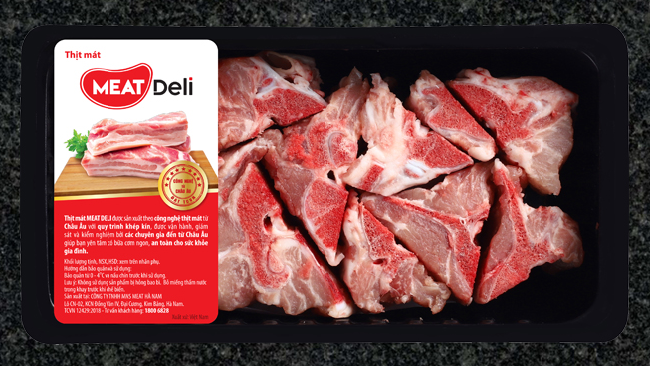Maersk rolls out electric trucks for inland transport in Vietnam
A.P. Moller–Maersk will deploy a fleet of heavy-duty electric trucks for inland container transport in Vietnam starting in the first quarter of 2026.




Masan Group is going to trade its MeatLife’s shares on the local stock exchange in 2019 and targeting at getting all of its subsidiaries on the board of stock by 2023 in a bid to maximise its shareholders’ benefits.

Masan Group Corporation (HSX: MSN) has changed the name of its subsidiary Masan Nutri-Science to Masan MeatLife yesterday. The meat business is also scheduled to be listed on the Unlisted Public Company Market (UpCoM) this year, subject to customary regulatory and corporate approvals.
According to Masan Group, its subsidiary listing is aimed at increasing the group’s strategic flexibility and better communicating its track record to the public. Apart from promoting greater transparency for shareholders, the UPCoM listing for Masan MeatLife, in this case, will also be a strategic step towards the meat business’s initial public offering on the southern bourse in 2022-2023.
The listing plan is thus consistent with Masan Group’s overall strategy to trade all of its main subsidiaries on the local stock exchanges in 2022-2023 to unlock significant value for shareholders.
Masan Group, as at December 31, 2018, owned 80.82 per cent of Masan Nutri-Science. Last year, Danish-backed PENM Partners bought 0.8 per cent of Masan Nutri-Science from Masan Group for $16 million. In 2017, global investment firm KKR traded $150 million for 7.5 per cent of the subsidiary.
Established in 2015, Masan Nutri-Science was originally an agri-commodity business producing animal feed and it has been transformed into a branded packaged meat business over the past years. Masan MeatLife has introduced the first officially certified chilled meat product MeatDeli in late 2018 under European standards and processing technology.
“Pork meat is the largest food and beverage category in Vietnam with a market size over $10 billion, 2.5x of dairy. Yet it is the most unstandardised, fragmented and unsafe category. With the successful launch of MEATDeli, our innovative chilled meat brand, we aim to revolutionise Vietnamese consumers’ meat life by fulfilling their big unmet need for delicious, safe and affordable meat products,” said Danny Le, chairman of Masan MEATLife.
Masan MeatLife has served over 700,000 consumers via over 125 points of sales in Hanoi, with a plan to launch in Ho Chi Minh City in September 2019.
MeatDeli is expected to deliver VND500 billion ($21.73 million) to VND1 trillion ($43.48 million) in revenues in 2019, and expected to widen its coverage to 500 points of sales in both Northern and Southern Vietnam. Management expects branded meat to contribute between 50-70 per cent of Masan MeatLife’s revenues by 2022 as consumers continually convert from unbranded meat products to branded, safe, traceable, hygienic and affordable meat products.
In the first quarter of 2019, Masan Nutri-Science reported VND3.192 trillion ($138.78 million) in net revenue during, down by 0.3 per cent on-year. Its animal feed net revenue was down by 1.6 per cent for the period, with growth in aqua and poultry feed offsetting the decline in pig feed volumes. The MeatDeli brand delivered VND20 billion ($869,565) in net revenue.
According to Credit Suisse, the success of MEATDeli over the long-term will revolve around the ability to scale up the retail distribution network to other areas in Vietnam and laying out a smooth supply chain. Development of cold-chain logistics which include chilled storage facilities and refrigerated trucks will be vital to preserve meat at low temperatures and maintain quality. Moreover, raising consumer awareness is essential as the concept remains new so far.
“We are optimistic on long-term success if cold chain logistics are executed well. That said, the spreading of African Swine Flu (ASF) and culling of industry hogs can cut feed demand (10 per cent reduction in sales = 0.7 per cent EPS impact). If the Masan Nutri-Science farm is affected and asset write-downs required, EPS can erode by 5-10 per cent,” wrote Credit Suisse in its equity research dated March 20.
Masan Group’s member companies and associates are known as industry leaders in branded food and beverages, consumer agriculture (meat), value-add chemical processing, and financial services.
Masan MeatLife, meanwhile, is Vietnam’s largest local feed-farm-food (3F) platform with an integrated supply chain to ensure traceable and hygienic branded meat products at affordable price points.
A.P. Moller–Maersk will deploy a fleet of heavy-duty electric trucks for inland container transport in Vietnam starting in the first quarter of 2026.
The partnership aims to expand the system of charging and battery swapping stations, providing Grab driver-partners and other EV users with easy access to flexible and reliable charging solutions.
Samsung Vietnam appoints Nguyen Hoang Giang to SEVT senior leadership, the first Vietnamese executive in the company’s local manufacturing units.
Michelin is undergoing a strong transformation by applying AI and smart analytic, helping lead the smart, safe, and sustainable mobility revolution in the Industry 4.0 era.
LG Innotek Vietnam Hai Phong secured a $200 million IFC loan as revenue slows, aiming to expand camera module production while meeting sustainability targets.
For Koen Soenens, Sales and Marketing Director at DEEP C, empathy is a compass that guides major deals, the way a leader builds a team, and the ambition to create a sustainable industrial zone that carries a Vietnamese identity.